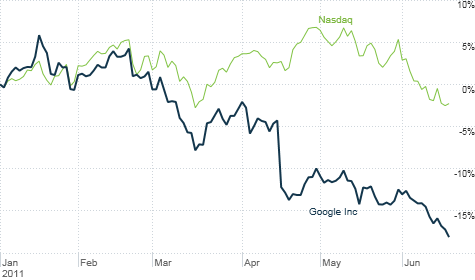Search News

The entire tech sector has taken a hit lately. But Google's stock has lagged the Nasdaq for most of the year. Click chart for more on GOOG.
NEW YORK (CNNMoney) -- Google is an innovative, 21st-century technology company. So why is its stock trading at a valuation similar to companies from an industry that had its roots in the early 1800s?
Shares of Google (GOOG, Fortune 500) have fallen more than 15% so far this year and dipped below $500 Thursday for the first time since September. On Friday, the stock fell 3% to close at about $485. At that price, Google is valued at about 14.5 times 2011 earnings estimates.

That's a slightly lower P/E ratio than railroad giant Union Pacific (UNP, Fortune 500) and only a bit higher than CSX (CSX, Fortune 500) and Norfolk Southern (NSC, Fortune 500). Huh?
Google is trading at only a slight premium to the overall market. That doesn't make a lot of sense.
Yes, Google's hypergrowth days may be behind it.
Earnings are expected to increase about 15% a year in 2011 and 2012. That's well below the nearly 30% annual growth rate investors have become accustomed to over the past few years.
And yes, the company faces much more competition from upstarts like Facebook as well as China search leader Baidu (BIDU).
But there's a big disconnect when you have a company that's growing at a much faster clip than the overall market priced as if it's a stodgy, mature blue chip.
It's even more absurd when you consider that Google has nearly $37 billion in cash on its balance sheet. That works out to about $114 a share.
If you subtract that from Google's stock price, then Google's core business is being valued at just 11 times earnings estimates.
Forget about railroads. That's a multiple more in line with beaten-down bank stocks and sleepy health care firms.
It's possible that some investors are nervous about how Google will do with co-founder Larry Page at the helm. Page took over as CEO from Eric Schmidt in April, and the bulk of Google's year-to-date stock slide has taken place since then.
However, it seems silly to believe that Google under Page will operate that much differently under Schmidt. Plus, it's not like Schmidt, who many investors viewed as the "adult supervision" at the company, has left. He's still chairman.
And oh yeah, did I mention that Google is still the undisputed king in the lucrative world of online search?
According to the most recent monthly figures from Web tracker comScore, Google's lead grew over Yahoo (YHOO, Fortune 500) and Microsoft (MSFT, Fortune 500). So much for that Bing partnership hurting Google.
Google has also done a stellar job of creating a new revenue stream for itself with its Android operating system. It's giving Apple (AAPL, Fortune 500) a run for its money in the mobile market. (Read iOS still narrowly ahead of Android in mobile ad revenue.)
Of course, Google doesn't benefit as much as Apple does in mobile, since Apple pretty much controls every aspect of its smartphone and tablet business. And Google has been cagey about breaking down its revenue by product segments.
But late last year the company did, in a rare moment of candor, disclose that mobile revenues in 2010 were on track to break $1 billion. It also said that display ads, which includes ads on Google-owned YouTube and other non-search ads, were on pace to generate $2.5 billion.
It seems logical to bet that sales from both businesses will increase from those levels in 2011.
Keep in mind that one key reason why Google's earnings growth is slowing now is because the company is wisely investing heavily in research and development and is hiring aggressively.
That may hurt margins in the short run, but it allows Google to come up with ideas for new businesses that can boost profits over the long haul.
And throughout its brief history, Google has shown that it will not run its business just to meet the fickle quarter by quarter demands of Wall Street. It should be commended for that, not penalized.
Google is not going away. Even if it never recaptures the momentum it had shortly after going public in 2005, who cares? Shares of one of the world's best companies are on sale.
To put it in terms that railroad investors can understand: All aboard!
Reader comment of the week. There's been a lot of chatter about a certain online radio IPO. Pandora (P) went from dot-com boom to dot-com bust in about a day. I made light of their questionable business model and untargeted advertising over on Twitter.
One reader, a new follower of mine who has been very active this week, had this gem. He compared Pandora to two larger techs that are loathed by investors.
"$P must have $CSCO & $HPQ board members...." quipped Shannon Merritt, aka @saxmon. Very nice! Although in defense of Cisco (CSCO, Fortune 500) and HP (HPQ, Fortune 500), they are at least profitable!
The opinions expressed in this commentary are solely those of Paul R. La Monica. Other than Time Warner, the parent of CNNMoney, and Abbott Laboratories, La Monica does not own positions in any individual stocks. ![]()